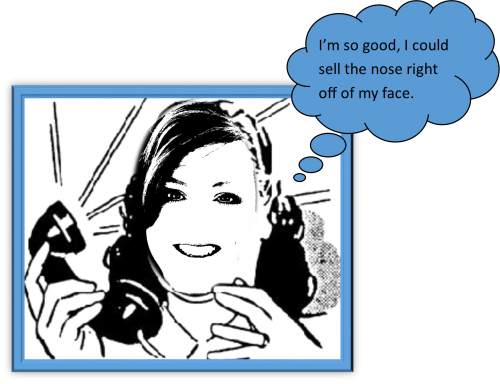Last updated on March 13th, 2019 at 05:48 pm
When you’re good at speaking, but you SUCK at selling.
Many of us professional keynote speakers love to speak but hate to sell. Especially women. Many of us women got that “it’s rude to talk about money” gene, along with the “what if they don’t like me” gene, along with the “just smile and be polite” gene – that might make for a good combination at dinner parties, but doesn’t work so well in a sales call. And the truth in this business is that you will get NOWHERE if you don’t know how to sell. So for those professional speakers out there who rank selling on the phone right up there with a colonoscopy, here are some easy tips to help make the process a little easier.
For the sake of this conversation, I am talking about the kind of sales call you have when someone calls you inquiring about your services. I am not equipped to tell you how to cold call, because I don’t believe in it. So this is for the person who has called you up wanting to know more about you because they have an event and they are looking for a speaker.
1. If they call you and leave a message, CALL THEM BACK THAT DAY. I can’t believe how many clients are surprised not only that I returned their call, but that I returned it so quickly. Maybe those other speakers out there don’t need the business as much as I do. But I know that I stand a better chance of getting the job if I can get back to them the same day they call. First one in is often the one they pick.
2. Act happy when you answer the phone. Every time that phone rings, answer it as if you have been waiting all day to get that call. Put everything down and smile (even though they can’t see you) and put your feet up and stop everything and listen to that person on the phone with every ounce of attention you have. I can’t explain it, but it makes people feel good when they know they have your attention and that you are even excited about talking to them. Don’t fake happy, just be happy they are calling. If it weren’t for these people, you’d be flipping burgers.
3. Listen first. Don’t sell. Don’t think about what you want to say. Don’t start planning your pitch. This is just a chance to get to know someone. Listen to them. Sometimes they don’t really know where to start, or they may just ask you your fee right away. NEVER START THE CONVERSATION WITH YOUR FEE. I never quote my fee first – not as a stall tactic (which it is) – but as a way to figure out what they want me to do! How can I quote my fee if I don’t know the scope of work involved? If someone calls and asks your fee right away, then say something like this, “Sure! I’d be happy to quote you a price, but first I need to know more about what you are looking for, so that I can determine whether I am a good fit. I would rather see you get the right speaker, than take a job I’m not a good fit for. Do you have a moment to just tell me about your group and what this event is all about?” They always have a moment. So just listen without responding and without worrying about how you can meet their needs. This is not the time. This is the building relationship stage of the game.
4. Take notes while they speak. Good notes. Stop them if/when you need clarification on something they said because you didn’t quite understand it. Ask questions, but only if needed to help you understand. Still not the time to start responding to their needs.
5. Once they stop talking about their group and their event (you will feel when it is winding down) then BEFORE YOU START PITCHING you want to recap what they just said, but in a shorter way. Something like, “So what I’m hearing you say is that your group is struggling with stress and change, that you all work in the healthcare industry, and that you are gathering for an educational conference and are looking for some motivation and tips on how to deal with stress and change in a fun and different way. Do I have that right?” (You are showing them that you listened, and that you are aware of exactly what they need.) Sometimes I rush into the pitching of myself only to find (thirty minutes later) that they need something totally different and if I had LISTENED first, I would have gone into the conversation from an entirely different way.
6. Ask them how they found you, and what made them call YOU. I ALWAYS want to know what is bringing people to my door, but even more, I want to know what made them stop at my website. Why, out of hundreds of other choices, did they stop and say “Wait, I want to talk to this one” ? This is something most speakers forget to ask, yet I think it is one of the most valuable questions we can ask a client. It tells us what they like about us – what grabbed their attention – what they liked about our site – what unique qualities we have that they found appealing. Often as speakers we make assumptions that turn out not to be true. We think they are booking us because we’re funny, when they’re booking us because they like our story. Asking the client why they picked you, will also help when you write your speech. If they picked you because they believe your message about standing out in a crowded market is so important, then you want to make sure that you include that in your speech. Maybe they talk about how funny you are, which is a sign that they want a lot of funny in your program.
7. Now it’s your turn to tell the short story of how what you do will help create the experience they have just described. Notice I used the word “story”. I did this because I don’t want you to just list off your features and benefits. Tell a story of the experience you will create, and how it will make their audience feel, and how it will meet their needs and more. Be excited when you talk. Use examples of things you did for other groups. When I talk to a client, it’s not in a “let me list all the things I can do” way, but in a “oh my gosh, this sounds like so much fun…what if I did this….and how about a little of this…and then I could do some of this.” When I talk to clients I’m not like the Staples guy listing all the things that computer has. I’m a friend who’s been invited to your party and I get to help you put it together, with all the things I really LOVE to do!” If you act excited about this opportunity, they will be excited about booking you. And if you see this as a fun conversation to have with someone, just sharing what you love, then the process will become fun instead of feeling like you’re lining up for an enema.
Notice that we haven’t even talked about money yet. Yet most of your “selling” has already been done. It’s all about having a fun positive experience with the client – becoming likeable – showing them you care – showing them the personality that they will experience on stage. Many of my jobs are sold before money ever even comes up.
8. “So how much is your fee?” they now ask me nervously, because now they want me and they’re not sure they can afford me. “How much is your budget?” I ask. Or at least that’s what all the sales trainers tell me I should do next. For some reason, in many cases I can’t bring myself to ask them that question because it feels the same to me as if I were to ask my hairdresser how much it costs to cut my hair and she says, “How much do you have?” I would immediately assume that she is going to charge whatever I say. So while it may be the worst advice in the world, I’m not going to fault you for not asking their budget. I think it’s more important that you know your fee. What to charge is a common anxiety among professional speakers. I get it. I still stress over it way more than I should. Rather than going into a long conversation about what to charge, I’m just going to say that when that person calls you to speak, you need to have had all this worked out. You need to know your fee. Period. You also need to know if you’re willing to negotiate, under what terms and conditions, and how low you are willing to go. If you’re like me, every negotiation is different and depends on the terms of that situation. I don’t have some secret Batman fee that I can spit out if they don’t have the money for my fee. So when someone asks me what I charge, I tell them: “My fee is …….. How does that fit into your budget? And they tell me. I used to tell them my fee and then immediately start negotiating before I even knew if they could pay it. Don’t ever assume somebody has your fee, and don’t assume they don’t. Quote your fee and ask them how it fits into your budget. I don’t say, “Does that fit into your budget?” I say, “HOW does that fit into your budget?” For some reason I think using the word “How” opens the door more to having a conversation about it. If your fee is in their budget, then we can end the conversation here because you can just wrap it up. But more times than not (at least in my case) my fee isn’t in their budget.
9. “Do you have a discounted fee?” they often ask, to which I say, “No, I don’t have a discounted fee. My fee is ….. If you don’t have that in your budget, tell me what you do have, and we can talk about a way to make that work.” See how easy that is? And comfortable for everybody involved? I never give them some discounted rate because they might have actually had more than that. I want them to make me their best offer – not try to get my best offer. I try to avoid saying, “Tell me what you have, and I will tell you if I can make it work.” Though sometimes I do say that, and it all works out in the end.
10. When the client gives me the price they can pay, I must determine if I am willing to do the job for that. I take a look at that number (sometimes I will think on it and call them back later) and determine what I would want them to trade in return for lowering my fee. Sometimes they don’t have anything good to trade, but I decide to take the job because I see a hidden opportunity, or because I’m not doing anything else that day. Whatever my reason.
I think your most valuable tool when it comes to handling a sales call is your perspective. When you go into a call like it’s a job interview and you’re listing all your credentials and features and benefits, and nervously waiting to see if they bite, that “needy-ness” comes across to them. Desperation gives them the power. When you look at your time as valuable, and consider that a better offer might come along for that date, and when you ask questions that indicate you’re trying to decide whether you WANT to take this job – you get some of that power back. I have actually had clients try to sell me on taking their job. I’m not talking about being a diva (BAD MOVE). I’m talking about respecting what YOU bring to the table as much as how much you may want to get the job.
At the end of the day, a sales call is simply a means to make a new friend, share with them what you do, help them solve their problems, and do what you love. Once you’ve had hundreds of these calls, and your calendar is full, and you really step into the power that you hold, this will become as easy as anything else in your business. It just takes a little getting used to. I hope that after this post, your heart doesn’t race half as much. Happy selling! Kelly
Kelly Swanson is an award-winning storyteller, comedian, motivational speaker, Huffington Post Contributor, and cast member of The Fashion Hero television show airing on Amazon Prime. She is also the author of Who Hijacked My Fairy Tale, The Land of If Only, The Story Formula, and The Affirmation Journal for Positive Thinking. She was a featured entertainer for Holland America Cruise Lines, keynote speaker for the International Toastmasters Convention, and has keynoted major conferences and corporate events from coast to coast. She just launched her one-woman show Who Hijacked My Fairy Tale in theaters, and it is being booked all over the country. In July of 2022, she was inducted into the National Speakers Association Speaker Hall of Fame.
Note: Articles by Kelly may contain affiliate links and may be compensated if you make a purchase after clicking on an affiliate link.





